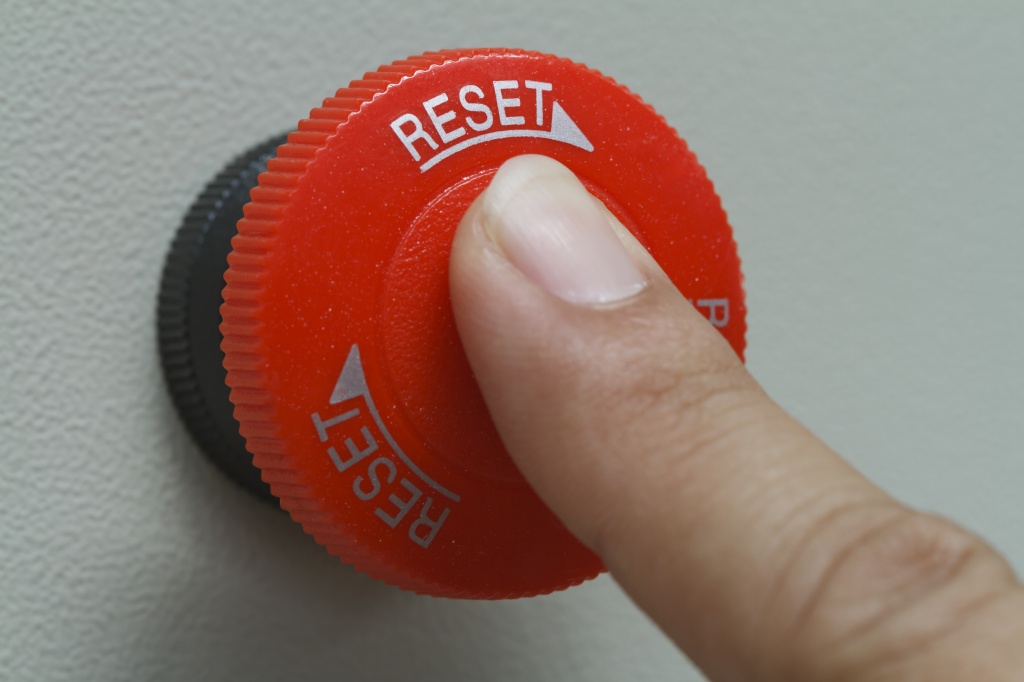
I was on a Zoom call a few weeks ago, and the facilitator said something that stuck with me. She said, “We’re in a pause right now as a community, and the big reset is coming.” I’ve been dwelling on this ever since she said it. And my mind keeps veering off and chewing on what the BIG RESET might look like.
To be clear, I don’t think the “big reset” is the same thing as the “New Normal,” which everyone seems to be talking and worrying about.
When I think of the “big reset,” I think of the weeks and months immediately after your state or local community lifts its coronavirus shelter-in-place order. Whereas, the “New Normal,” in my opinion, describes the changes in our collective behaviors that will have a structural impact on us individually and collectively (e.g. workplace, businesses, transportation systems, recreation, etc).
In the last few weeks, I had speculated on how nonprofits might be impacted in the New Normal. But I haven’t shared any thoughts on the big reset because it was all still too fuzzy for me. However, two recent random encounters during my morning walk provided me with an AH-HA moment.
Twice now I’ve crossed paths with a gentleman from India on my early morning walks. I had never met this man before. He is literally a stranger to me.
The first time we met, we were walking towards each other on the walking path. And as I always do with anyone I come across while out-and-about, I looked up, made eye contact, smiled and wished the stranger a “good morning.” What happened next took me by surprise.
This complete stranger returned my smile with one of his own. He came to a complete full-stop and just started talking at me as if we had known each other for quite some time. The following are just a few snippets from that conversation:
- Hi, my name is ______________.
- He was born in India and migrated to Canada as an adult.
- When he decided to migrate from Canada to the United States, his friends told him that he needed to be OK with two things: 1) women work in America and 2) the weather is cold.
- He used to drive a cab.
This literally went on and on for 10-minutes. Of course, I did my best to politely nod and grunt acknowledgements when it seemed appropriate to do so.
I chalked the entire experience up to a random chance encounter. But then it happened again approximately a week later.
Apparently, I was now his best friend. This time he simply stopped walking. There was no smile or pleasant social greetings. And he just started talking. It was almost as if the last conversation had never ended. For the next 15-minutes, we stood in drizzling rain and he expressed frustration and political opinions at me. He said things like . . .
- He is a good citizen. He pays his taxes and doesn’t cheat. He can’t believe what the government is doing to the economy and to good people like him.
- He’s been good. He is abiding by the shelter-in-place order. But he is a taxpayer. And he feels like a victim.
- He has been reading about Asian-Americans being victimized because of the misguided belief that their community is to blame for COVID-19. He didn’t think that was right.
- However, he thinks it is China’s fault and they need to be held accountable.
- He is concerned about how nuclear powers like India, Pakistan, and Russia will be impacted by COVID-19 ,and what it means for all of our safety and security.
- I don’t know how he got there, but he ended our conversation with lots of cheerleading for the state of Israel. And he emphatically concluded everything by stating that if George W. Bush were still President of the United States none of this would be happening.
As you can imagine, I was slack-jawed. And the only thing I found myself saying periodically throughout the conversation was, “Well, all we can do right now is practice patience and acceptance.” To which he never really responded and would just dive back into the conversation where he had left off.
Both times I walked away feeling like I had just tumbled down the rabbit hole and found myself in Wonderland.
So, I share these two experiences with you because I think the BIG RESET is going to feel like we’ve tumbled down a rabbit hole and landed in a strange and unfamiliar place.
Human beings are social creatures. And in my opinion, all of this social distancing will have people craving social interaction.
Trauma can take many different forms. And in my opinion, a community trauma is being perpetrated by this pandemic. While everyone reacts differently to trauma, I suspect some people might be heading into the BIG RESET with something similar to PTSD. I hope I am wrong.
But most importantly, I hope each of you take one thing away from this blog post, which is . . .
These people are your board members, volunteers, donors, staff and clients.
Are you ready? And if not, what are you doing to get ready?
Please use the comment box below to weigh-in with your thoughts. We can all learn from each other.
Erik Anderson
https://thehealthynonprofit.com/
https://www.facebook.com/thehealthynonprofit/
